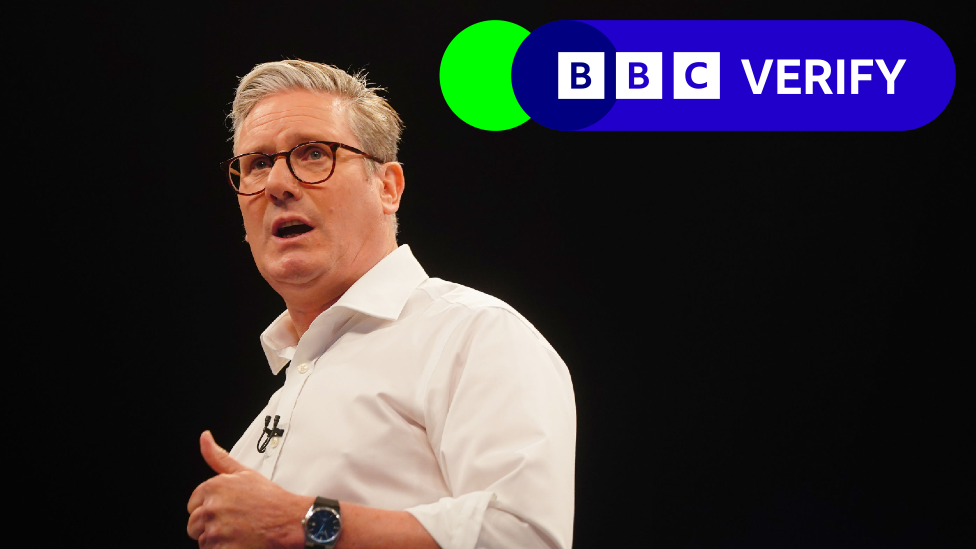Labour's claim of £71bn of unfunded Tory spending fact-checked

- Published
If you've been following the campaign closely, you'll know that Labour claimed that the Conservatives had made “unfunded spending pledges” of £46bn, before raising this to £64bn and then £71bn.
The £71bn comes from, external Labour's costings, external of Conservative ambitions such as abolishing National Insurance and inheritance tax.
But the Tories have not said yet whether these ambitions will turn into policies or pledges for the next Parliament, should they remain in power.
Abolishing National Insurance
Sir Keir Starmer asked in Parliament on 1 May: "Has the Prime Minister found the money to fund his £46bn promise to abolish National Insurance?"
The government has cut NI for employees twice in 2024, taking it from 12% to 8%.
It has also said it wants to abolish NI completely, but has not given a timescale for this.
Chancellor Jeremy Hunt described it as his "long-term ambition" but acknowledged that it would not happen in the next Parliament - in other words, not before 2030.
He has also been clear, external he is only talking about NI for workers. NI is also charged to employers.
The £46bn is a fair estimate of what it would cost to abolish NI for workers today:
It cost, external about £10bn to cut NI for employees by 2p in the pound to 8p, so cutting the remaining 8p would cost about £40bn
It cost about £750m to cut NI for the self-employed by 2p in the pound to 6p, so the remaining 6p would cost about £2.3bn
It would cost, external about another £3bn to abolish the 2p additional rate for earnings above £50,268
And abolishing the additional rate for the self-employed would be about another £500m
The chancellor told Andrew Marr, external: "We're saying as soon as we're able to afford to do this because the economy has grown and because public finances are in a position to be able to do it, this is something we want to do."
That would mean that the cut would be funded, although we do not know exactly how.
"I take Mr Hunt as setting out an aspiration, rather than a firm commitment," said Helen Miller from independent think tank the Institute for Fiscal Studies (IFS).
"Of course, there are always lots of things a government would like to do when finances are brighter, so the real question is whether Mr Hunt would prioritise cutting NICs [National Insurance Contributions] over everything else, whenever 'conditions allowed'."
Abolishing inheritance tax
Chancellor Jeremy Hunt gave an interview to the Telegraph, external in which he described inheritance tax as “profoundly anti-Conservative”, but did not say whether abolishing it would be in the manifesto.
It is charged at 40%, but only on the part of the estate that is worth more than £325,000, with certain allowances.
Mr Hunt is understood to have considered reducing the 40% rate in the past but decided against it.
Labour has assumed he would abolish it altogether, at an annual cost of £7.5bn, which is the amount that the Office for Budget Responsibility expects, external to be raised from the tax this year.
What is inheritance tax and who pays it?
- Published19 November 2024
Tax 'distortions'
In the same interview with the Telegraph, Mr Hunt talked about the "distortions in the tax system" for people earning between £60,000 and £125,000.
Those include the withdrawal of child benefit, which begins at £60,000. The chancellor is currently consulting on how to reform it.
Labour has costed that at £4bn, based on an estimate from the independent think tank the Resolution Foundation from last year. BBC Verify spoke to the Resolution Foundation who updated their model and said it would now be about £2.8bn. The IFS agrees with that £2.8bn figure.
Mr Hunt's "distortions" also includes the withdrawal of the income tax personal allowance for people earning over £100,000 - the personal allowance is the amount you are allowed to earn before you start having to pay tax.
Labour has costed that at £2.5bn. But the accountants RSM have put a much higher estimate of £4.7bn, external on that, based on the response to a Freedom of Information request to the government.
Ending green levies
Another £4bn comes from an interview that Energy Secretary Claire Coutinho gave to the Telegraph, external on 1 April, in which she said she was considering removing £4bn of green levies from household electricity bills.
But we do not know if that will actually make it into the Conservative manifesto or how it would be paid for.
How do they get to £71bn?
The Labour dossier includes other items of spending on:
National service for 18-year-olds
100,000 apprenticeships
Hiring additional staff to reduce tax avoidance
Higher personal allowance for pensioners
Labour's claim about extra mortgage costs
The Labour analysis assumes that all of the items in their dossier would be funded by extra borrowing.
But we do not know if all of these items will be in the Conservative manifesto or if they would be funded by borrowing.
Labour say that this borrowing would increase interest rates and so put up the amount that people have to pay on their mortgages. They base that mechanism on Treasury research, external.
Their dossier was titled: "Conservatives' interest rate rise".
They say it would increase the mortgage on a £285,000 house with a 20% deposit by £350 a month, although clearly there is considerable uncertainty behind that number.

